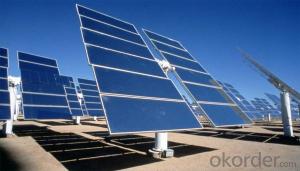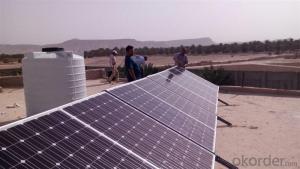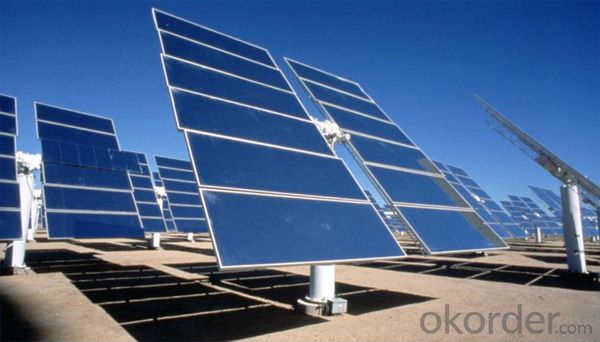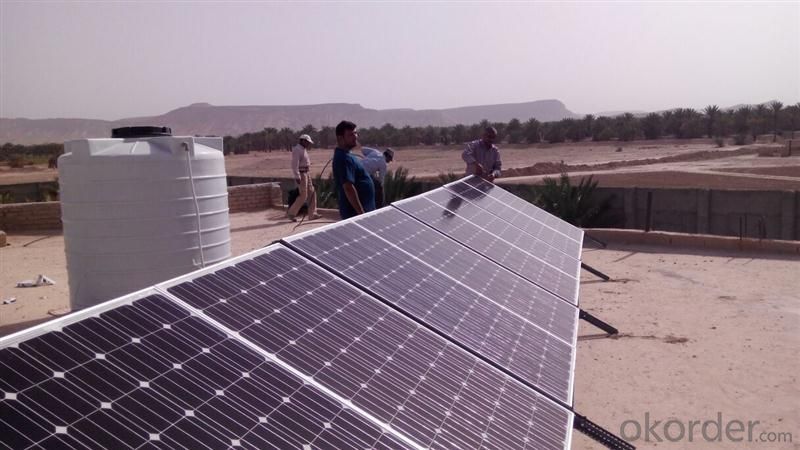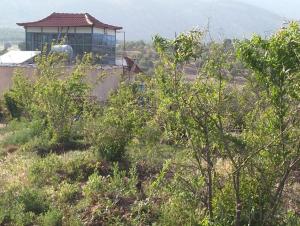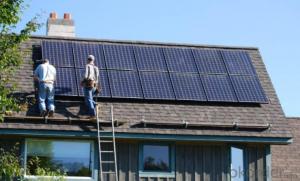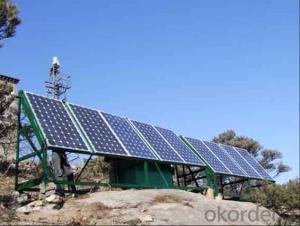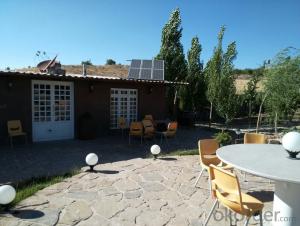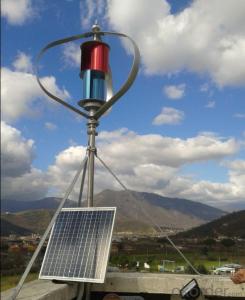Off-Grid Solar Power System 8KW High Efficiency
- Loading Port:
- China main port
- Payment Terms:
- TT OR LC
- Min Order Qty:
- 1 pc
- Supply Capability:
- 10000 pc/month
OKorder Service Pledge
OKorder Financial Service
You Might Also Like
1.Description of Product
Off-Grid Solar Power System is consisted of solar panel, solar charge controller, inverter, battery, mounting rack and cables.
(1).Grid-connected, send power to city grid
(2).MPPT technology, wide range of working voltage
(3).Simply Wiring, easy installation, customized design for your projects
(4).Low investment & long term feedback
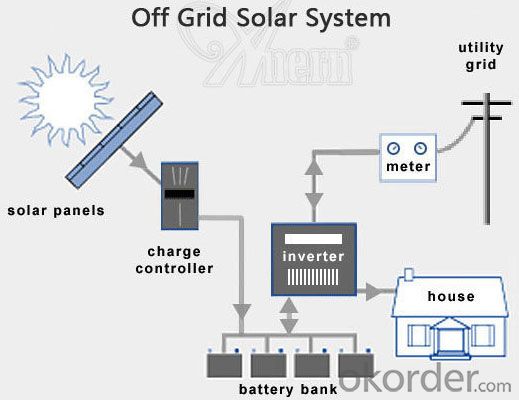
2. Off-Grid Features
1. Off grid solar power system is mainly used for application with relatively-small power consumption, and the areas have no grid network coverage, or grid power is unstable or outage condition.
2. It’s composed of solar panels, hybrid solar inverter, battery bank, solar panel mounting racks, and other accessories required fora complete home solar power system.
3. The battery bank gives a stable power output to the solar inverter which converts DC to AC to power loads, and provides power backup in rainy or cloudy days.
4. The solar panels generate electricity at daytime and charge the battery bank .
5. The off grid home solar power system provides grid power bypass in case of battery power shortage when sunshine is not enough.
6. All the off grid home solar power system configurations are worked out by scientific calculation and design.
The Product Parameter | |
Ref No. | 8KW |
Solar Panel | Type: Monocrystalline Silicon PV Module Max Power: 250W QTY:16 pcs |
Controller-Inverter Integrator | Rated Ouput Power: 5000W Rated DC Voltage: 48V QTY:1 pcs |
Battery | 12V/200AH per piece QTY:12 pcs |
Solar Panel Rack | Roof type mounting rack, anodized aluminum material, including complete fittings (Other type of racks can be customized as per client's requirement) QTY:1 pcs |
Cables | International standard, with specification suitable for solar system, BVV1*10 QTY:80m |
3.The Pictures of Product
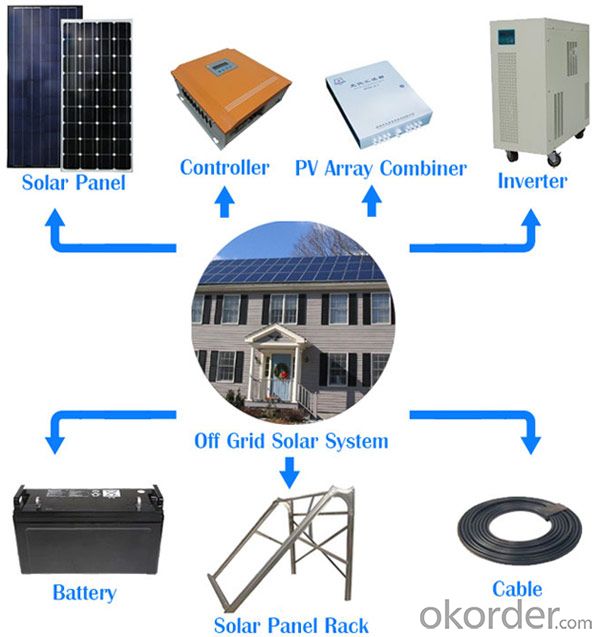
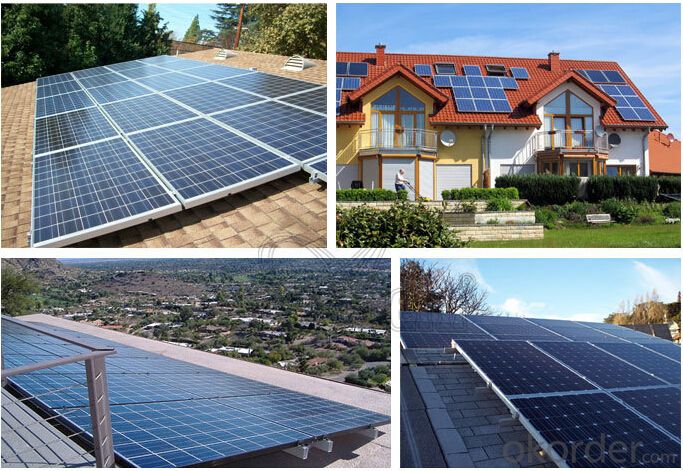
4.FAQ
Q1: What is the business type for the company?
A1: We are one of the biggest manufacturers inBejing.Chnia. Which is a high tech PV enterprise dedicated to the research, development, production and sales..
Q2: How long solar panel warranty can you offer?
A2: 10-Year product warranty,25-year linear power output warranty
If there is any quality problem, we will pay for freight and send free parts to you.
Q3: How many certificates do you have?
A3: We have 16 certificates,such as CE, TUV, UL, and so on.
Q4: Can I be the agent for you?
A4: Yes,We can discuss some information.
Q5: How to get a sample?How can cooperation with us
A5: contact us now.
- Q: Can solar energy systems be used in areas with limited access to emergency services?
- Yes, solar energy systems can be used in areas with limited access to emergency services. Solar energy systems are independent and self-sufficient, requiring minimal maintenance and intervention. They can provide electricity for various purposes, including powering emergency communication devices, lighting, and medical equipment. Additionally, solar energy systems can reduce reliance on traditional energy sources, making them a reliable and sustainable option for areas with limited access to emergency services.
- Q: Can solar energy systems be used in areas with limited financial resources?
- Yes, solar energy systems can be used in areas with limited financial resources. Solar power has become increasingly affordable and accessible in recent years, making it an attractive option for communities with limited financial resources. Additionally, solar energy systems can provide long-term cost savings by reducing or eliminating reliance on expensive fossil fuels. Various financing options, such as leasing or community-based solar programs, can further help make solar energy systems more affordable for low-income communities.
- Q: What is the role of batteries in a solar energy system?
- The role of batteries in a solar energy system is to store excess energy generated by the solar panels during the day and provide power during times when the sun is not shining, such as at night or during cloudy weather. This allows for a continuous and reliable supply of electricity from the solar energy system.
- Q: Can solar energy systems be used for powering restaurants?
- Yes, solar energy systems can definitely be used for powering restaurants. Solar energy systems, also known as photovoltaic (PV) systems, convert sunlight into electricity using solar panels. These panels can be installed on the rooftop or any other suitable location to capture sunlight. Restaurants typically have high energy demands due to the need for lighting, heating, cooling, and various kitchen appliances. By utilizing solar energy systems, restaurants can significantly reduce their reliance on traditional energy sources and lower their electricity bills. The electricity generated by solar panels can be used to power all aspects of a restaurant's operations, including lighting, refrigeration, cooking equipment, and HVAC systems. Excess electricity generated during peak sunlight hours can be stored in batteries for use during cloudy or nighttime periods, ensuring a continuous power supply. Moreover, solar energy is a clean and renewable source of power, which means it has minimal impact on the environment. Restaurants can showcase their commitment to sustainability and reduce their carbon footprint by adopting solar energy systems. This can also be a valuable marketing tool, attracting environmentally conscious customers who appreciate businesses that prioritize renewable energy. In conclusion, solar energy systems are a viable and efficient solution for powering restaurants. They provide a reliable and sustainable source of electricity, reduce operational costs, and demonstrate a commitment to environmental responsibility.
- Q: Are there any safety concerns associated with solar energy systems?
- Yes, there are some safety concerns associated with solar energy systems. The main concerns include the risk of electric shock during installation or maintenance, fire hazards due to faulty wiring or equipment, and potential exposure to hazardous materials during manufacturing or disposal. However, with proper installation, maintenance, and adherence to safety standards, these risks can be effectively mitigated, making solar energy systems a safe and reliable source of renewable energy.
- Q: How do I monitor the performance of my solar energy system?
- To monitor the performance of your solar energy system, you can use various methods. One way is to install a monitoring system with software that provides real-time data on energy production, consumption, and system efficiency. This system can track key metrics like solar panel output, battery charge levels (if applicable), and overall system performance. Additionally, you can monitor your utility bills to see the impact of your solar energy system on your energy consumption and savings. Regularly checking for any noticeable changes in energy production or system issues can also help ensure optimal performance.
- Q: How do solar energy systems impact the energy efficiency of buildings?
- Solar energy systems can greatly improve the energy efficiency of buildings. By harnessing the power of the sun, solar panels generate electricity, reducing the dependence on traditional energy sources. This, in turn, decreases the overall energy consumption of the building, leading to lower utility bills. Additionally, solar energy systems can help regulate indoor temperatures by reducing the need for air conditioning during hot periods and providing supplementary heating during colder months. Overall, solar energy systems play a significant role in enhancing the energy efficiency of buildings and reducing their carbon footprint.
- Q: How much energy can a solar energy system produce in a day?
- The amount of energy a solar energy system can produce in a day depends on various factors such as the size and efficiency of the system, weather conditions, and geographical location. On average, a well-designed solar energy system can produce around 4 to 6 kilowatt-hours (kWh) of electricity per kilowatt of installed capacity in a day.
- Q: What is the lifespan of solar cells used in solar energy systems?
- The lifespan of solar cells used in solar energy systems can vary, but on average, they can last anywhere from 25 to 30 years.
- Q: Can solar energy systems be used to power remote locations?
- Solar energy systems are definitely capable of powering remote locations. In fact, they are particularly well-suited for such applications where access to the conventional power grid may be limited or non-existent. By installing solar panels in remote areas that receive sufficient sunlight, electricity can be generated even in off-grid locations. The typical solar energy system for remote locations consists of photovoltaic (PV) panels, which convert sunlight into electricity, and a battery storage system to store excess energy for use during non-sunlight hours. This ensures a reliable and continuous power supply, even in areas without grid access. Rural communities, remote research facilities, off-grid cabins, and telecommunications towers can greatly benefit from solar energy systems. They provide a sustainable and renewable source of energy, reducing dependence on fossil fuels and minimizing environmental impact. Furthermore, solar energy systems require minimal maintenance and are cost-effective in the long term, making them an ideal solution for powering remote locations.
Send your message to us
Off-Grid Solar Power System 8KW High Efficiency
- Loading Port:
- China main port
- Payment Terms:
- TT OR LC
- Min Order Qty:
- 1 pc
- Supply Capability:
- 10000 pc/month
OKorder Service Pledge
OKorder Financial Service
Similar products
Hot products
Hot Searches
Related keywords
